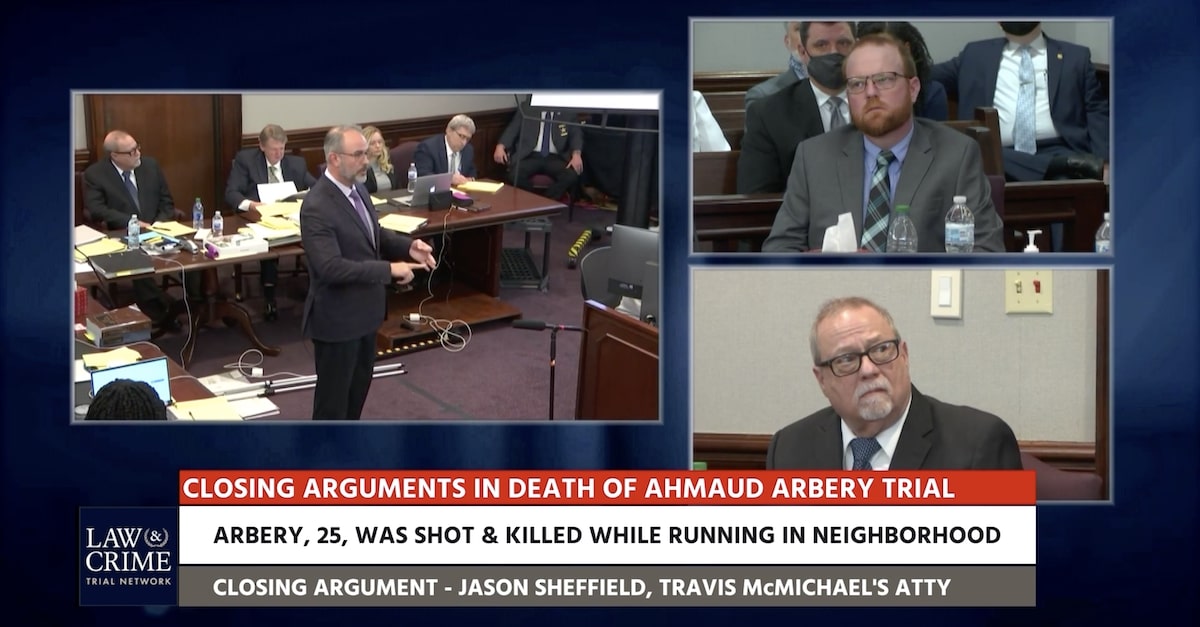
Presenting a portrait of Ahmaud Arbery’s killers largely absent from the state murder trial, the now-convicted murderers’ federal trial kicked off on Monday with a prosecutor quoting gunman Travis McMichael unleashing a fusillade of racist language and imagery.
Travis McMichael and his father Greg McMichael are currently serving sentences of life imprisonment without the possibility of parole after a Georgia jury found them guilty of murder late last year. Their neighbor and convicted accomplice William “Roddie” Bryan will have the opportunity to apply for parole after 30 years.
In achieving those convictions, Georgia prosecutors strategically downplayed the topic of race, but opening statements in the federal trial confronted the subject matter directly. Indeed, a federal prosecutor told the jury that their burden is to prove that the McMichaels and Bryan violated Arbery’s rights “because of his race and color.”
In making that case, prosecutor Bobbi Bernstein—the deputy chief of the Department of Justice’s Civil Rights Division—gave the jury an earful of the racial slurs used by the gunman, apologizing for speaking that language in an uncensored form.
She quoted Travis McMichael using the N-word to describe his happiness of his employment in his seemingly all-white workplace.
“Zero n****rs work with me,” he allegedly said. “They ruin everything.”
Travis McMichael allegedly added he liked his contracting job because there’s “not a n****r in sight.” He also called Black people “criminals,” “monkeys” and “sub-human savages,” the prosecutor added.
In another disturbing incident, Travis McMichael commented on a social media post of a man with a firecracker in his nose.
“It would have been cooler if it blew the f***ing n****r’s head off,” the gunman was quoted as saying.
According to the prosecutor, Travis McMichael said that he made that remark to an associate because he assumed a Black man had stolen his gun from his unlocked pickup truck in December 2019.
That was the crime that Travis McMichael would later blame on Arbery, but the prosecutor noted that he never had any evidence the 25-year-old had done anything wrong.
Travis McMichael’s attorney Amy Lee Copeland told jurors that she is not asking them to approve of her client’s language.
“You might think that these words and these opinions are absolutely wrong,” she said. “I do.”
Copeland quibbled with the characterization of her client as a vigilante.
“When I think of vigilantes, I think of Batman and Robin,” she said, calling her client more of a concerned neighbor than Gotham City.
Copeland then recapped her client’s failed defense in his state trial. She said that Arbery was spotted inside the house of Satilla Shores homeowner Larry English, and her client believed Arbery committed a crime in entering the property. She claimed that it was this belief, not his racial animus, which precipitated her client’s actions that day.
“I am not going to ask you to like Travis McMichael,” she said. “I am not going to ask you to conclude that he’s done nothing wrong.”
She would, however, ask them to find him not guilty of the federal crimes charged.
Often summarized as a “hate crimes” trial, the government emphasized to the jury that their burden at trial is not to show that the men hated Black people.
“It requires that the defendants acted because of race,” the prosecutor said.
Suggesting the apple didn’t fall far from the tree, the prosecutor also said that Greg McMichael went on a rant after civil rights luminary Julian Bond’s death in 2015.
Greg McMichael’s attorney Attilio J. Balbo said some of the remarks the jury will hear about at trial are older: “Many of those comments are from 15, 20 years ago or more.”
Balbo added that he would not comment that his client is an “angel,” nor would he minimize or excuse that language.
Bryan’s attorney James Pete Theodocion commented that he would not defend the racism that came out of the mouths of his client’s co-defendants.
“I’ve heard the N-word more today than I’ve heard in three or more years,” Theodocion said.
Adding that his client may have made remarks that would embarrass him, Theodocion said, trial would show “with Roddie Bryan, you won’t see a man who sees the entire world through the prism of race.”
Bryan’s lighter sentence in the state murder trial reflected what a judge found to have been a lesser role. The McMichaels were initially prepared to plead guilty to federal charges in return for a transfer to federal prison for the first 30 years of their sentence. The agreements would have included admissions from the McMichaels that their crimes were racially motivated.
Arbery’s family opposed the deal, preferring that the men serve their sentences in harsher state custody, and a federal judge rejected the terms.
As a result, the McMichaels followed in Bryan’s footsteps to fight their charges at a trial.
(Screenshot from the Law&Crime Network)